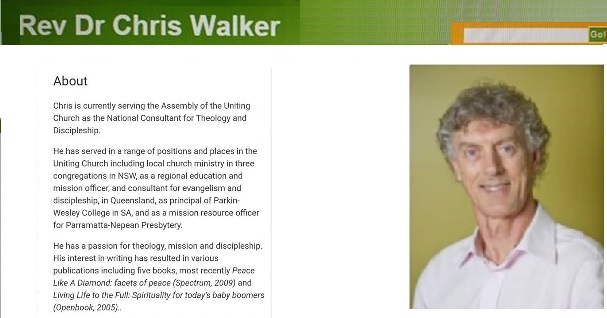with Rev Dr Chris Walker

What good is hate?
I am distressed at the continuing wars in Ukraine and Palestine, let alone other wars that receive less attention such as in Sudan. The people involved in these wars hate each other. Their supporters often also show their hatred. Israel, or at least many in leadership and many ordinary people, hate Palestinians. Not surprisingly leaders and many people in nearby nations, such as Lebanon and Iran hate Israel. While there are historical reasons for the enmity which continues into the present, my question has to do with the value of hate.
Hate is a strong human emotion. When things happen that we feel are unjust or against us, hate is often aroused in us. When people mistreat us, our response can be to dislike them to the point of hatred. Unfortunately, historical acts can lead to hatred not only of the immediate people but generalise to a whole group of people. They are perceived as the enemy. They are seen as unworthy. They become objects of hatred. Hate can serve to motivate action. What has happened cannot simply be ignored or forgotten. However, how we respond is important.
The Bible speaks about hate. The psalmist says, “The Lord loves those who hate evil” (Psalm 97:10). The prophet Amos says, “Hate evil and love good and establish justice” (Amos 5:15). Leviticus has, “You shall not hate in your heart anyone of your kin” and goes on to say, “You shall not take vengeance or bear a grudge against your people; but you shall love your neighbour as yourself” (Leviticus 19:17). Jesus made use of this last instruction making it the second great commandment after loving God wholeheartedly. Micah turned Amos’ statement around to criticise rulers who are unjust, who “hate the good and love the evil” (Micah 3:2). Paul wrote to the Roman Christians saying, “Let love be genuine; hate what is evil, hold fast to what is good” (Romans 12:9).
What the Bible says is that we are to hate evil and love good. That requires making a distinction between evil acts and identifying people as evil. While it is people who do evil, we are not to hate people as such but rather oppose their unjust and evil actions. Making this differentiation also means we allow for the possibility of the person repenting and changing
We are to be on the side of what is just and good and against that which is unjust and evil. That may well mean protesting and challenging what we see as unfair and evil policies and practices. Particular people may well be challenged if they are responsible for these policies and practices leading to harm and suffering for people. Political leaders are rightly called to account when they engage in evil even when they say it is for national security or whatever. Nevertheless, it is not appropriate to oppose evil by tactics that amount to evil, such as the use of violence against people. Violence is often justified as necessary to highlight the evil but if people suffer as a consequence, it is not acceptable.
One of Jesus’ most challenging statements is as follows. “You have heard that it was said, ‘You shall love your neighbour and hate your enemy.’ But I say to you, Love your enemies and pray for those who persecute you, so that you may be children of your Father in heaven; for he makes his sun rise on the evil and on the good, and sends rain on the righteous and on the unrighteous” (Matthew 5: 43-45). Just as God continues to send sun and rain on people, whether they are good or evil, just or unjust, so we are to show God-like love to people. This even includes those who show us evil and persecute us. Jesus in Luke’s gospel has a similar statement, “Love your enemies, do good to those who hate you, bless those who curse you, pray for those who abuse you” (Luke 6:27-28). Paul clearly draws on this to say, “Bless those who persecute you; bless and do not curse them…. Do not repay anyone evil for evil, but take thought for what is noble in the sight of all” (Romans 12:14,17).
The usual response in our world is to want to get back at people. They often call this seeking justice, namely punitive justice, “an eye for an eye” approach. It frequently goes beyond this, which at least is proportional, to become outright revenge that willingly inflicts increased evil on the other. In Genesis there is an ancient song. In it, Lamech says: “I have killed a man for wounding me, a young man for striking me. If Cain is avenged sevenfold, truly Lamech seventy-sevenfold (Genesis 4:23-24). It illustrates the increase in violence from measured response to unlimited revenge. The counter response of Jesus comes when Peter asks how often he should forgive – as much as seven times? Jesus answers, “Not seven times, but I tell you, seventy-seven times” (Matthew 18:21-22). For Jesus there was no limit to love and forgiveness. He rejected the way of revenge.
Jesus spoke of non-violent responses to those who take advantage of and do evil to others. Evil is not to be accepted but nor is the response one of responding to evil by violence and evil in return. Instead loving but non-violent actions are called for to highlight the evil and seek to have it changed.
Hate, then, can motivate us to oppose evil. We can name it and call people to account. However, we are to do so not by revenge but in love. Such love involves non-violent action, truth telling and calling for change recognising the worth of all people, especially those who suffer at the hands of others. We are to hate evil but not persons or groups as such. Instead, we are to love good which involves loving others, even those perceived as enemies. Such love is not easy but is what Jesus called for from his disciples.

Chris Walker
http://revdrchriswalker.wordpress.com/
Chris is currently serving the Assembly of the Uniting Church as the National Consultant for Theology and Discipleship.
He has served in a range of positions and places in the Uniting Church including local church ministry in three congregations in NSW, as a regional education and mission officer, and consultant for evangelism and discipleship, in Queensland, as principal of Parkin-Wesley College in SA, and as a mission resource officer for Parramatta-Nepean Presbytery.
He has a passion for theology, mission and discipleship. His interest in writing has resulted in various publications including five books, most recently Peace Like A Diamond: facets of peace (Spectrum, 2009) and Living Life to the Full: Spirituality for today’s baby boomers (Openbook, 2005).
증오가 무슨 소용인가?
저는 우크라이나와 팔레스타인에서 계속되는 전쟁에 괴로움을 느낍니다. 수단에서처럼 덜 주목받는 다른 전쟁은 말할 것도 없습니다. 이 전쟁에 연루된 사람들은 서로를 증오합니다. 그들의 지지자들도 종종 증오를 드러냅니다. 이스라엘, 또는 적어도 많은 지도자들과 많은 일반인들은 팔레스타인 사람들을 증오합니다. 놀랍지 않게도 레바논과 이란과 같은 주변 국가의 지도자들과 많은 사람들이 이스라엘을 증오합니다. 현재까지도 계속되는 적대감에는 역사적 이유가 있지만, 제 질문은 증오의 가치와 관련이 있습니다.
증오는 강한 인간의 감정입니다. 우리가 불의하거나 우리에게 불리하다고 느끼는 일이 발생하면 종종 우리 안에서 증오가 일어납니다. 사람들이 우리를 학대하면 우리의 반응은 증오에 이를 정도로 그들을 싫어하는 것입니다. 불행히도 역사적 행위는 직접적인 사람들에 대한 증오뿐만 아니라 전체 집단으로 일반화될 수 있습니다. 그들은 적대자로 인식됩니다. 그들은 가치가 없다고 여겨집니다. 그들은 증오의 대상이 됩니다. 증오는 행동을 유발하는 데 도움이 될 수 있습니다. 일어난 일은 그냥 무시하거나 잊을 수 없습니다. 그러나 우리가 어떻게 반응하는지는 중요합니다.
성경은 증오에 대해 말합니다. 시편 기자는 “주께서 악을 미워하는 자를 사랑하신다”고 말합니다(시편 97:10). 선지자 아모스는 “악을 미워하고 선을 사랑하며 정의를 세우라”고 말합니다(아모스 5:15). 레위기에는 “네가 네 형제를 마음으로 미워하지 말라”고 나와 있고, “네 백성을 원망하거나 원한을 품지 말고 네 이웃을 네 몸과 같이 사랑하라”고 말합니다(레위기 19:17). 예수께서는 이 마지막 지시를 사용하여 온 마음을 다해 하나님을 사랑하는 것 다음으로 두 번째 큰 계명으로 삼았습니다. 미가는 아모스의 진술을 뒤집어서 불의한 통치자들, “선을 미워하고 악을 사랑하는”(미가 3:2) 통치자들을 비판했습니다. 바울은 로마 그리스도인들에게 “사랑은 진실하고 악을 미워하며 선을 굳게 붙잡으라”고 썼습니다(로마서 12:9).
성경에서 말하는 것은 우리가 악을 미워하고 선을 사랑해야 한다는 것입니다. 이를 위해서는 악한 행위를 구별하고 사람들을 악하다고 규정해야 합니다. 악을 행하는 것은 사람들이지만, 우리는 사람들을 그 자체로 미워하지 말고 오히려 그들의 불의하고 사악한 행동에 반대해야 합니다. 이러한 구별을 하는 것은 또한 그 사람이 회개하고 변화할 가능성을 허용한다는 것을 의미합니다.
우리는 정의롭고 선한 편에 서고 불의하고 사악한 것에 반대해야 합니다. 이는 우리가 불공평하고 사악한 정책과 관행으로 보는 것에 항의하고 도전하는 것을 의미할 수 있습니다. 특정 사람들은 이러한 정책과 관행으로 인해 사람들에게 해를 끼치고 고통을 초래하는 책임이 있다면 도전을 받을 수 있습니다. 정치 지도자들은 국가 안보를 위해서라 하더라도 악에 가담하면 당연히 책임을 져야 합니다. 그럼에도 불구하고 사람들에 대한 폭력 사용과 같이 악에 해당하는 전술로 악에 반대하는 것은 적절하지 않습니다. 폭력은 종종 악을 강조하기 위해 필요하다고 정당화되지만 그 결과로 사람들이 고통을 받는다면 용납할 수 없습니다.
예수님의 가장 도전적인 말씀 중 하나는 다음과 같습니다. “너희는 ‘네 이웃을 사랑하고 네 원수를 미워하라’고 말한 것을 들었거니와 나는 너희에게 이르노니 너희 원수를 사랑하고 너희를 박해하는 자를 위하여 기도하라 이는 너희가 하늘에 계신 너희 아버지의 자녀가 되게 하려 함이라 그는 악한 자에게나 선한 자에게나 해를 돋우시고 의로운 자에게나 불의한 자에게나 비를 내리심이니라”(마태복음 5:43-45). 하나님께서 선하든 악하든, 의롭든 불의하든 사람들에게 해와 비를 계속 보내시는 것처럼, 우리도 사람들에게 하나님과 같은 사랑을 보여야 합니다. 여기에는 우리에게 악을 보이고 우리를 박해하는 자도 포함됩니다.누가 복음에서 예수님은 비슷한 말씀을 하셨습니다. “너희 원수를 사랑하고 너희를 미워하는 자에게 선을 행하고 너희를 저주하는 자를 축복하고 너희를 학대하는 자를 위하여 기도하라”(루가복음 6:27-28). 바울은 이것을 분명히 인용하여 “너희를 박해하는 자를 축복하고 저주하지 말라… 아무에게도 악으로 악을 갚지 말고 모든 사람 앞에서 고상한 것을 생각하라”(로마서 12:14,17).
우리 세상에서 흔히 하는 반응은 사람들에게 보복하고 싶어하는 것입니다. 그들은 종종 이것을 정의를 추구하는 것, 즉 징벌적 정의, “눈에는 눈” 접근 방식이라고 부릅니다. 이것은 종종 이것을 넘어서서, 적어도 비례적으로, 상대방에게 더 큰 악을 기꺼이 가하는 노골적인 복수가 됩니다. 창세기에는 고대 노래가 있습니다. 그 노래에서 라멕은 이렇게 말합니다. “내가 나를 다치게 한 사람을 죽였고, 나를 때린 청년을 죽였습니다. 카인이 일곱 배로 복수를 받는다면, 라멕은 참으로 일흔일곱 배로 복수를 받습니다(창세기 4:23-24). 이것은 절제된 대응에서 무한한 복수로 폭력이 증가하는 것을 보여줍니다. 베드로가 얼마나 자주 용서해야 하는지 물었을 때 예수님의 반대 반응이 나옵니다. 일곱 번이나 용서해야 합니까? 예수님은 “일곱 번이 아니라 일흔일곱 번이라도 용서해야 합니다”(마태복음 18:21-22)라고 대답합니다. 예수께는 사랑과 용서에 한계가 없었습니다. 그는 복수의 길을 거부했습니다.
예수께서는 다른 사람을 이용하고 악을 행하는 사람들에 대한 비폭력적 대응에 대해 말씀하셨습니다. 악은 받아들여서는 안 되지만, 악에 폭력과 악으로 대응하는 것도 대응이 아닙니다. 대신 사랑하지만 비폭력적인 행동이 악을 강조하고 그것을 바꾸려고 노력하는게 필요합니다.
그러므로 증오는 우리가 악에 반대하도록 동기를 부여할 수 있습니다. 우리는 악을 명명하고 사람들에게 책임을 물을 수 있습니다. 그러나 우리는 복수가 아니라 사랑으로 그렇게 해야 합니다. 그러한 사랑에는 비폭력적 행동, 진실 말하기, 모든 사람, 특히 다른 사람의 손에 고통받는 사람들의 가치를 인정하는 변화 촉구가 포함됩니다. 우리는 악을 미워해야 하지만 개인이나 집단을 그 자체로 미워해서는 안 됩니다. 대신 우리는 선을 사랑해야 하는데, 여기에는 다른 사람, 심지어 적이라고 여겨지는 사람도 사랑하는 것이 포함됩니다. 그러한 사랑은 쉽지 않지만 예수께서 제자들에게 요구하신 것입니다.
번역 = 크리스천라이프 편집부

